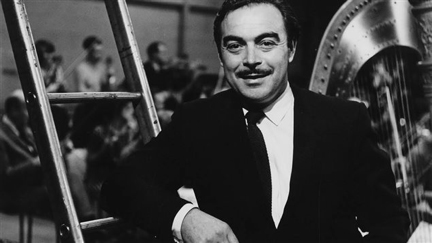
Year Born: 1925
Year Died: 2000
Born May 17, 1925 in a tiny house in Saint-Lupicien, Manitoba, Henri Bergeron was from a family of thirteen children. His father was a farmer and railwayman.
Henri Bergeron was the first French-speaking host appearing on air in 1952, when Radio-Canada, the French service of CBC, inaugurated its TV broadcasts.
Previously, in 1946, he had served as the first on-air announcer at CKSB Saint-Boniface, Manitoba, Western Canada’s first French-language radio station.
In his memoirs, Henri Bergeron would later note that the Winnipeg Free Press objected to the launch of this radio station. The newspaper would have preferred seeing a Ukrainian or German-language radio station in the province, since the French-speaking community in Manitoba was smaller than these other communities.
Henri Bergeron pursued his studies at the Collège des Jésuites in Saint-Boniface, eventually completing a doctorate of law at the University of Manitoba in Winnipeg. During this period, he discovered how attracted he was to entertainment and communications. In 1943 came his theatre debut alongside novelist Gabrielle Roy, at the Cercle de Molière, Canada’s oldest theatre company. But he would not go on to become an actor.
The following year he married Yvonne Mercier, a nurse, with whom he would have five children.
After his start in broadcasting in Saint-Boniface he served as program director at CKCH Hull from 1949-1952, before being recruited by Radio-Canada. He would remain at the public broadcaster for 33 years, as host and presenter of prestigious shows and series including many gala productions such as the inauguration of CBFT on September 6, 1952 alongside Montreal mayor Camilien Houde.
He presented many TV shows, but is best remembered as the elegant host of the weekly entertainment series Les Beaux Dimanches, which brought plays, concerts, variety specials, films and documentaries into millions of homes.
Henri Bergeron helped create the “Radio-Canada” style, delivering the polished, cultivated French that French-Canadian elites liked at the time. He maintained a high standard of French on air, and trained a long series of radio and TV hosts in this tradition. He was equally at ease in English. He earned the respect of the viewing public, thanks to a combination of playfulness and simplicity.
He also did narration for the National Film Board productions and was a professor of Communications at the University of Montreal.
He wrote several books, among them two collections of shorter pieces and two autobiographical narratives: Un bavard se tait … pour écrire; Récits de la Montagne Pembina (1989), Le Coeur de l’arbre: Le bavard récidive (1995) and L’Amazone (1998). He also brought out a how-to book for communicators in 1992, La communication … c’est tout!
He received many awards and distinctions over the years, among them an award from the Conseil de la vie française de l’Amérique (1963). He was invested as an officer of the Order of Canada in 1978, a member of the Ordre des francophones d’Amérique in 1989, a member of the Ordre de la Pléiade in 1994, and a “chevalier” of the Ordre national du Québec in 1995. He was posthumously awarded the Prix Georges-Émile-Lapalme, in 2000.
Henri Bergeron died of cancer on July 10, 2000.
References:
https://www.journaldemontreal.com/2013/04/06/les-bergeron
https://www.thecanadianencyclopedia.ca/en/article/henri-bergeron
https://fr.wikipedia.org/wiki/Henri_Bergeron
http://bilan.usherbrooke.ca/bilan/pages/biographies/347.html
